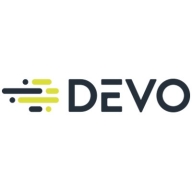

LogicMonitor and Devo are both powerful monitoring platforms that cater to different aspects of IT infrastructure management. LogicMonitor has the upper hand in ease of use and customer service, while Devo's advanced features justify its higher cost.
Features: LogicMonitor has comprehensive monitoring capabilities, real-time alerts, and ease of integration. Devo offers advanced data analytics, custom visualizations, and scalability. LogicMonitor provides straightforward functionality, whereas Devo has more robust and sophisticated features.
Room for Improvement: LogicMonitor could enhance its reporting features and expand its device coverage. Devo could simplify its setup process and reduce the learning curve associated with its advanced features. Both products need minor enhancements, with LogicMonitor needing to broaden its core capabilities and Devo focusing on user accessibility.
Ease of Deployment and Customer Service: LogicMonitor is praised for its quick deployment and responsive support team. Devo's deployment can be more complex, but its customer service is commendable. LogicMonitor is favored for faster setup, whereas Devo, once deployed, provides powerful assistance.
Pricing and ROI: LogicMonitor is more budget-friendly with quicker ROI due to its straightforward implementation. Devo demands a higher initial investment, but users requiring its advanced analytics and capabilities find the long-term ROI justified. LogicMonitor suits simpler needs, whereas Devo is preferred for sophisticated monitoring requirements.
The return is more of value and savings in preventing costly downtime, making the savings of about $60,000 which we would have lost without LogicMonitor, and in IT staff efficiency, we save approximately 15 hours a week.
I can definitely notice a difference in our posture, uptime, and ability to solve problems and resolve outages much quicker since we have had LogicMonitor in place.
We need to be able to reach them in real-time, and without those kinds of options available, we have to set up ad hoc calls, which could be improved.
Customer support is on point and very well trained.
The product mostly just works without issues.
As your company grows, you are able to scale effectively by just deploying additional collector machines.
LogicMonitor's scalability absolutely meets our organization's growth needs.
LogicMonitor scales well
It is very stable. I have never seen LogicMonitor itself go down.
Since we implemented LogicMonitor and got it working in production, there has been no downtime, no reliability issues, and nothing major regarding flare-ups from LogicMonitor's perspective.
Integrations with other sandboxes could be improved to better interpret data using AI and machine learning models.
If LogicMonitor looks into going beyond the topology-based correlation to include AI that can group related alerts from different parts of the stack into a single probable cause incident, that will significantly improve the system.
The container monitoring seems to be really behind compared to some bespoke cloud-native monitoring solutions that are designed around Kubernetes, containers, and ephemeral environments.
We have to set up an email or reach out to support and try to set up an ad hoc call, which cannot be done in real-time when time is the most sensitive issue.
I experienced no issues with pricing, setup cost, and licensing; it was very transparent, and the licensing model is very clear and easy to understand.
When they see a spike in a line chart for a failed login, which could be a true or false attempt, they can click that spike, and a table widget on the same active board instantly populates with raw logs of data for those specific failed logins.
The dynamic alerting and root cause analysis have helped us fix issues before they cause a full-blown outage or degrade performance for end users.
Our SLAs and SLOs were averaging about 10 to 15 failed SLAs and SLOs that were over the time allotted to get those resolved, and those are now down to about two to three per week.
LogicMonitor has expanded our view of our systems and has reduced our mean time to resolution, as now engineers that work on specific issues are able to very quickly identify what the cause is.
| Product | Market Share (%) |
|---|---|
| LogicMonitor | 4.2% |
| Devo | 1.1% |
| Other | 94.7% |

| Company Size | Count |
|---|---|
| Small Business | 8 |
| Midsize Enterprise | 4 |
| Large Enterprise | 11 |
| Company Size | Count |
|---|---|
| Small Business | 11 |
| Midsize Enterprise | 10 |
| Large Enterprise | 10 |
Devo is the only cloud-native logging and security analytics platform that releases the full potential of all your data to empower bold, confident action when it matters most. Only the Devo platform delivers the powerful combination of real-time visibility, high-performance analytics, scalability, multitenancy, and low TCO crucial for monitoring and securing business operations as enterprises accelerate their shift to the cloud.
LogicMonitor offers flexible IT monitoring with customizable dashboards and robust alerting capabilities. It integrates seamlessly with third-party apps like ServiceNow and provides a single-pane view for diverse IT environments, aiding in proactive issue resolution and enhancing operational efficiency.
LogicMonitor stands out with its capability to monitor diverse infrastructures including Cisco Voice systems, data centers, and virtual environments. Supporting servers, storage, networking devices, and applications, it provides seamless integration with cloud services like AWS and Azure. Users leverage its scalability and flexibility, benefiting from dynamic thresholds, anomaly detection, and detailed visualization. All these features contribute to improved management of IT assets and streamlined operations. Users suggest improvements in mapping, reporting, and automation for remediation, desiring more customizations and an expansive application performance monitoring toolset.
What are LogicMonitor's key features?LogicMonitor is widely implemented across industries, providing monitoring for infrastructure in sectors like telecommunications, cloud computing, and managed services. Managed service providers particularly value its ability to track client environments, deliver proactive alerts, and generate comprehensive reports, while its integration with cloud platforms like AWS and Azure offers users centralized management and visibility into IT assets worldwide.
We monitor all AIOps reviews to prevent fraudulent reviews and keep review quality high. We do not post reviews by company employees or direct competitors. We validate each review for authenticity via cross-reference with LinkedIn, and personal follow-up with the reviewer when necessary.